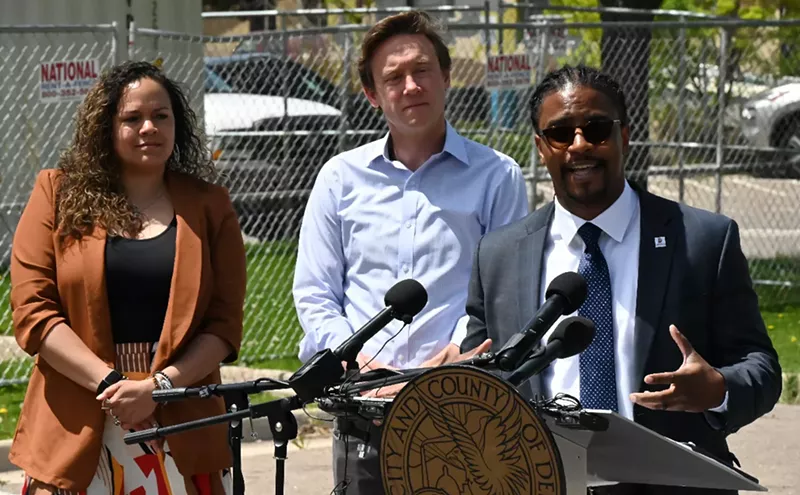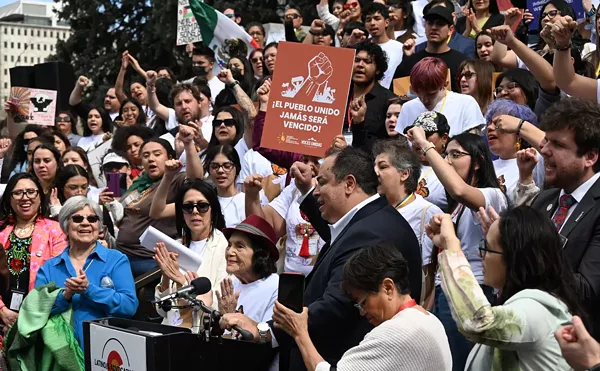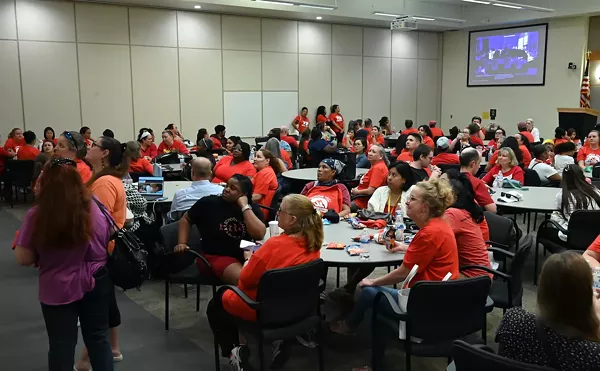Tom Tancredo suddenly found himself with a lot of free time earlier this month. When the five-term Colorado congressman ran for president of the United States on a single platform — illegal immigration — he'd called it his last political act. But then on August 1, 2010, Tancredo became a surprise, last-second American Constitution Party candidate for governor of Colorado, an office that some national pundits had him winning as late as 6 p.m. on November 2.
Tancredo didn't, of course. After a wild three months of campaigning and criss-crossing the state, he conceded to Democrat John Hickenlooper shortly after 8 p.m. that night. Hickenlooper wound up with a clear majority of the vote, with Dan Maes, the official Republican candidate, taking just 11 percent. And Tancredo? He pulled in more than 36 percent, over 600,000 votes, even though the ACP has fewer than 2,000 members.
Still, Tancredo suddenly had a lot of time on his hands — hands that picked up the phone when I called to ask if he'd be interested in debating immigration with Gustavo Arellano, the Orange County-based author of ¡Ask a Mexican!, who was going to be in Denver for a guest professorship at Metropolitan State College the next week. Ever since Westword had first started publishing Arellano's column, I'd wanted to host a debate between the two. And now, finally, the time was right.
Tancredo and Arellano met on the stage of the former Denver Civic Center, now Su Teatro (Tancredo is nothing if not game), in front of a packed house on Tuesday, November 16. I was the moderator for a discussion that needed no moderating; these two could have gone on for days about everything from Chuck Taylors to whether Saint Rocco was an enforcer for the mob to how to say "shithead" in Spanish. Read the full transcript and watch the unedited video. Here are some of the highlights from that meeting of the minds.
Gustavo Arellano: Tom is somebody I have slammed, repeatedly, in my column. Tom is somebody, who, well, Tom has never read my column. Which is okay, it is okay. So Tom, I continue to call you, always, a Know Nothing.
Tom Tancredo: Yeah, I've been called worse.
GA: You've been called worse, I'm sure. I do believe you can have rational discussions about the economic impacts of illegal immigration...but you've said that unlimited migration to this country is causing people to not assimilate, is causing people to not become Americans — and is different from the immigration from your grandparents' generation of two generations ago. So let me ask you this: My dad came to this country illegally, in the trunk of a Chevy. My mom dropped out of school in ninth grade. They've lived their lives in the United States for forty-some years, and 95 percent of their lives, they speak in Spanish. My first language was Spanish. I grew up in an all-Mexican neighborhood; I grew up in a neighborhood where everyone from our region of Mexico migrated. I basically grew up in Mexico — so how is it I'm talking to you in English if we can't assimilate, if the children of illegal immigrants can't assimilate, or if this current generation of immigrants, as you say, does not assimilate as quickly as others?
TT: The fact that you do what you do, the fact that you write the column that you write, the fact that you are so defensive about this issue is an indication that acculturation and assimilation has not occurred.... I think it's excellent that we started off with that, Gustavo, because we can, and do, argue all the time about the economic implications of massive immigration — both legal and illegal. Especially at times of 10 percent unemployment. But beyond that, even if we had 4 percent unemployment, massive immigration that does not come along with massive assimilation is problematic. And just learning English is not the only way to determine whether assimilation has gone on.
Juan Hernandez was in charge of a newly created ministry in Mexico called, at the time, "The Ministry for Mexicans Living in the United States." It was later changed to be a little more all-inclusive, I suppose. But he was a fascinating fellow with whom I had a number of debates...and he talked about what his purpose, his role was as the head of that ministry. He said it was to first encourage immigration into the United States from Mexico. And it didn't matter if it was legal or illegal. The government would help provide the transportation, do whatever they could to move as many Mexican citizens into the United States as possible. When I asked why, he would say, well, it's a win-win situation. We have a huge unemployment problem for people between the ages of 18 and 25, we can essentially ship them to the United States, you get cheap labor, they send back money. He said half of his time was spent in the United States, in order to assure that the population, the Mexican citizens that were coming, did not "go native" on him....
In the United States, we have enormous numbers of people who are absolutely committed to a sort of "cult of multiculturalism," the idea that there is nothing of value in the United States, that people coming here from any country, not just Mexico, should retain their allegiance — not just cultural ties — but allegiance to another country, because who would want to be part of America?
GA: But Tom, listen to a Mexican. Listen to a Mexican whose parents, again, only spoke Spanish at home. They could speak to you in English, but they prefer to live their lives in Spanish. These are Mexicans who try to instill in this son, Gustavo, and my fellow siblings, yes, you are a Mexican, yes, be proud of your Mexican roots, but it's a failing effort. I'm telling you as somebody who, when I entered kindergarten, all I did was speak Spanish; within two years, I spoke English. I technically am probably much more American than I am Mexican. I am not an exception, I am the rule. Millions of people of my generation, sure, we have sentiment for our culture, Mexican culture, Mexican society, but at the end of the day, we're still here in the United States.
And what exactly do you ask of us? I went through college, graduated from high school, got my master's degree, I pay taxes, I vote. I don't vote Democrat or Republican, so that will make you happy as a third-party candidate. I usually vote Green or Libertarian — I just flip it around. So then, what more do you want?
TT: The question becomes one of not just the opportunities that America provides, because everybody came here for that. My grandparents — 1890s, early 1900s — they came here to access the opportunities that America provided. Just like everybody else comes. But there was this difference, and it was observable. It was observable in any conversation you had with them about their desire, their deep-seated desire to cut the ties, especially any political ties that held them to the country of origin, and become an American — and what did that mean for my grandparents? And my parents, who were first generation-Americans? It meant they couldn't speak Italian, because their parents wouldn't let them. And in a way, I'm sad about that, because I wish that I were bilingual. I had a hard enough time with the only language that I have.
GA: I just know vaffanculo — that's all I know.
TT: I know cabeza de mierda — that's about all I know. So there we are.
GA: We have a love of cursing.
TT: But there was this feeling, Gustavo...wanting to become Americans emotionally, as well as every other way. Wanting to feel themselves as American citizens, not as citizens of any other country....
GA: But you're saying, then, that the old immigrants came to be a part of the country, but while those immigrants were coming, there were those exact same attacks that you hear about Mexicans and Latinos and other people today. So if you take anything away from me today, the point on this issue of acculturation is that we love to lionize the immigrants of the past while reviling the immigrants of the present. But that has been part of America since the very beginning....
PC: This one is for Tom Tancredo: During the election that, as we know, just ended two weeks ago —
TT: What election?
PC: You said you would immediately stop illegal immigration. But we never heard exactly how, except "Just watch me." Can you tell us now how you would have done it?
TT: Sure. And I did say over and over and over again that there were ways in which we could actually deal with this issue in a humane way.... Here is what you can do: You can enforce the law. We have, on the books in the state of Colorado, a couple of laws that are really pretty good — Senate bills 90 and 1023, both of which are designed to reduce the amount of illegal immigrants in the state of Colorado by saying, number one, you cannot have sanctuary cities; the other one talks about the need for people to show proof of citizenship in order to obtain social services benefits. Now, unfortunately, neither of those laws have ever been enforced. Had I been governor, I certainly would have enforced both of those laws. But there is a more important one that we would have put through, and if the legislature wouldn't have gone along, I would have gone to the people of the state because I think they would have passed it. And that is something called "mandatory E-Verify."
The great allure, of course, for people who are coming here illegally is a job, right? We all recognize that. Oftentimes a job at which these people are exploited. Because they are here illegally, and hence an employer can pay them less than what would be the going rate for somebody who is a legal resident. And the threat always of turning you in to ICE [Immigration and Customs Enforcement] is there, and so many, many people are exploited by employers. The way to deal with that is to enforce something called E-Verify. E-Verify is a process by which employers would have to go to a Social Security website and put in the Social Security number of someone who is applying for a job, and if that Social Security number came back as being defective, they could not hire them until it was corrected.... That one thing has more power to actually reduce the number of illegal immigrants coming into the state of Colorado than anything else. It actually worked pretty well in Arizona.
GA: Something else scared people off from Arizona: Joe Arpaio.
TT: Sheriff Joe Arpaio. Right. Well, the interesting aspect of all of this stuff is that when put to a vote, when put to a test in terms of a poll, most Coloradans agreed with that particular proposal. Most Hispanics in Colorado, according to the poll, also agreed with it. The Zogby poll that came out a little bit ago — 56 percent of Hispanics in the United States agree that there is too much immigration coming into the United States altogether. Now, this is heartening, and certainly something I talked about all during the campaign.... I am proud of the fact that, in at least one poll, I had more Hispanic support than Mayor Hickenlooper...
GA: But just because a certain segment of the population supports something does not make it right. And so saying somehow that Latinos are in favor of stricter immigration reform does not necessarily make it right.
TT: You don't think that's true?
GA: Polls? I don't believe most polls.
TT: I wish I didn't, either...
GA: But that is something that has always fascinated me about you: You have this emphasis on, okay, we need to crack down on the employers. We need to crack down, you know, if we stop it, whether it's E-Verify or something else, then we can somehow stem the flow of illegal immigration. But that is also the root cause of immigration, period: It's the economy. Is it the worker, or it is businessmen who want to have cheap labor?
TT: Exploit is the word.
GA: Exploit. But that has also been the American way. America has demanded cheap labor. I think to truly, completely stem the flow of illegal immigration, you truly have to crack down on capitalism, on the businesses. But we would never do that because that would reek of socialism.
TT: Just watch.
GA: Sure, okay. Just watch.
TT: Because I would guarantee you that is exactly where I would go, because that is the nexus. That's where you can deal with this issue, because you don't have to be rounding people up; you don't have to be doing anything nearly as extreme as that. You simply have to say: The thing for which you came you cannot get. And therefore, people either go home or they go someplace else.
GA: And what does that do to business?
TT: I'll tell you what it does to business. It tells them they're going to have to meet the market. You know, labor is a market just like anything else, and so the fewer number of people you have to work for you, what happens? What happens in any market system? It is not anti-capitalist, it is pure capitalism. Because the fewer number of people that are applying for the jobs available creates this other phenomenon. It's called higher wages. Because they meet at some place; they meet.
GA: The last thing the American businessman wants to do.
TT: Tough crap!
GA: I would argue that folks are misdirecting their ire at the immigrants, as opposed to the businesses and the industry that hire them.
TT: Let's go after those businesses. I'm all for it.
GA: Let's go smash capitalism! Let's do it right now. Let's go.
TT: Fine. You wanna say smash capitalism; I simply say it's obeying the law. And there are all kinds of laws that employers have to obey.... Now would you say, well, we shouldn't have health codes because that's anti-capitalist? B.S. It's got nothing to do with capitalism. These are the regulations that you operate under. One of them is hiring people who are legally present in the United States. There's nothing wrong with demanding that of any employer in this country. That's the main issue....Who is our first loyalty to? Is it not to the people who are here, who have either gone through the process directly, or were born here? And Gustavo, I don't care. I can say this a million times, and I don't know if you'll ever believe me, sir, but I will tell you, it's got nothing to do with race. In my heart, nothing.
GA:...I understand that. And I would believe you, Tom, if you weren't so insistent, that you will not believe that even among this wave of immigrants, whether they are legal or illegal, that we don't become American. That we don't become acculturated. You do not want to believe that, and that's why/where we have this difference in opinion. So when you give me these good economic arguments, I might disagree, I might agree. But when you start talking about culture, it all flies out the window. And I'm sorry about that.... We have a huge crowd that's fully acculturated, but still very proud of their roots. We're telling you, we're telling you that we're acculturated. You don't believe it, hence the interest in the debate.
PC: One more question here. You've already agreed to smash capitalism and that you like to curse. Let's see if we can get an agreement on one more thing: Do you think the USA will ever intervene and help our neighbors fight this war against drugs? Where are you on drugs?
TT: Legalize them.
GA: Wow. We agree on that!
TT: Legalize marijuana, and that is big. Let me tell you, that drug war is lost; it has been lost for years. The billions of dollars spent, the thousands of upon thousands of lives that have been spent also in this war that is completely and totally un-winnable. I always argue this — and it's certainly one of the reasons, by the way, I am not governor of the state of Colorado.
PC: Wrap up with the message that you would like the audience to walk out with tonight.
GA: Since I had the first say, Tom, you can have the last word. I would just like the people out there to take, again, my family's story: My dad was an illegal immigrant, he came to this country in the trunk of a Chevy in 1968, he hopped the border fence, back when it was just chain-link and not the stuff you like out there now, three-pronged. He came, he crawled through a sewer, he came to this country every which way but loose. I was the first son of four, only spoke Spanish when I entered school. This illegal-immigrant dad, this illegal alien, this menace invading society, he created three children who have college degrees, two of them advanced, another son going to college. He votes in every election, he's even against illegal immigration, Tom. Go figure that one out....
TT: I can figure that one out.
GA: But in this family, this family of Mexicans who still basically live in Mexico in the United States, you have some of the best Americans you will ever meet, and my family is not the exception, we are the rule. The Reconquista is nothing more than myth coming from three different mythologies that I can't get into, but read westword.com — you can read it right there. We could talk about economics all day, but on the issue of acculturation, whether you want to believe it or not, Mexicans acculturate into America, and America does not want to believe that. That's been the case, going back in Colorado, in the Southwest, for 400 years. We Mexicans will continue to do what we have always done — which is be part of this country.
TT: The question, of course, that we never really got to deal with to any great extent is: What is being part of the country? Being in America does not necessarily mean you are an American. And it doesn't matter where you come from. It is of no consequence. The country of origin, the ethnicity of the people who come — America has been successful in this process of assimilation and acculturation for a long, long time. And we have assimilated people who have come from all over the world, and of every color and background and ethnicity. And it is a tribute to America that it has occurred, as a result of a push inside the United States for assimilation and a desire on the part of the people to assimilate. That was the great phenomenon, the thing that described our victory in being able to have a country made up of so many different people. We are indeed a nation of great diversity. Also, when driven to a certain point, that can be unhealthy. You cannot have a nation that is focused on the idea of diversity as being the central theme. It's oxymoronic to think of a homogenous society made up of completely different people who accentuate the differences...I don't believe it is working.
I do not discount for a moment the millions of Hispanic people who have come to the United States of America and been certainly as good Americans as my family or anybody else that you could possibly think of. I absolutely know that's true. I have never discounted that, ever. They are out there, I see them, they talk to me all the time. They vote for me...and I appreciate that. What I'm talking about, of course, is something else that's occurring. And that is this sort of focus on — and almost obsession with — the concept of multiculturalism. This, to me, becomes problematic. To bring up the spectre of what Teddy Roosevelt warned us about, you know, we have massive immigration and it's great, but immigration without assimilation creates not a nation, but a polyglot boardinghouse. And I believe that is what we are becoming. Or at least what we are in danger of becoming, and hence a debate like this is great, Gustavo, because we can at least make people think about this.
So this is a good thing!












